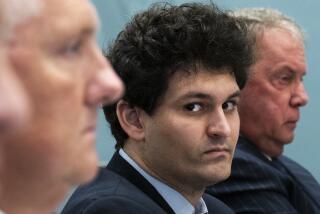Salvation Army, Greenpeace call off fight over bequest
- Share via
SEATTLE — When a modestliving man named Hector Guy Di Stefano died last summer at age 90, he surprised everybody by leaving a $264-million estate to be divided equally among eight charities.
What happened next between two beneficiaries, however, was less charitable: The Salvation Army sued, saying Greenpeace wasn’t entitled to a share of the fortune.
After a months-long legal battle, the groups announced last week that they had reached a settlement, averting what could have been an unseemly trial between two of the nation’s most high-profile humanitarian organizations.
All sides seemed relieved.
“I said at the beginning I was mystified by this,” said John Passacantando, executive director of Greenpeace USA. “Now we can move on to engaging in the great ecological fights of our era.”
The donation, the largest ever given to Greenpeace, is more than double the organization’s annual budget. Passacantando said he was meeting with senior managers Friday to discuss how to spend the money.
Greenpeace “never had a relationship” with Di Stefano, Passacantando said, adding that the organization will “work hard to make him proud.”
After the settlement, the Salvation Army issued a terse statement saying that “the parties fully believed in the positions they advanced.” Salvation Army spokeswoman Kathy Lovin added in a subsequent e-mail: “We are very grateful and honored that Mr. Di Stefano named us in his trust.”
Di Stefano did not tell the charities in advance that he planned to leave the gifts. The other organizations were the American Humane Assn., the World Wildlife Fund, Direct Relief International, the Disabled American Veterans Charitable Service Trust, the Visiting Nurse & Hospice Care of Santa Barbara and the Santa Barbara Foundation.
Di Stefano’s wealth came from his wife’s side of the family. Doris Di Stefano had inherited United Parcel Service stock from her father, an early executive of the company. She died in 2005, also at age 90.
The couple spent their last years in a middle-class neighborhood in the Seattle suburb of Issaquah. Those who knew the Di Stefanos said they had no idea the two were rich.
A longtime accountant for the family, Alan Miller, said Doris Di Stefano once told him that if “the neighbors knew how much money they had, she would just die.” For many years, before moving to Washington, the couple had lived quietly in Santa Ynez.
The Di Stefanos, Miller said, were private people. He loved gardening, and she was devoted to her cats. “That’s just the way they were,” Miller said. “They were unimpressed by their money. They had what they needed, they had each other, and that was enough.”
The couple, married 46 years, had no children. An obituary provided by his funeral home on FuneralNet.com said Di Stefano was born in Brooklyn, served as an Army Air Corps pilot during World War II and retired from the Federal Aviation Administration.
In his will, Di Stefano allotted $33 million to Greenpeace International. The year before he died, Greenpeace International dissolved and was absorbed by the related Greenpeace Fund.
The Salvation Army went to court, arguing that the specific organization named by Di Stefano no longer existed and therefore was not eligible for the gift. Instead, the Salvation Army said, that portion should be divided among itself and the other six charities.
Greenpeace lawyers countered by saying Di Stefano clearly wanted to donate to the environmental organization, regardless of its name. Under its current structure, Greenpeace considers itself a “tandem organization” made up of Greenpeace Fund and Greenpeace Inc. The first is primarily a fundraising arm; the second lobbies, advocates and runs campaigns.
Early this year, the Salvation Army and Greenpeace entered into mediation, and a trial was set to begin this spring.
The parties would not disclose details of the settlement or explain why Greenpeace’s portion was reduced from $33 million to $27 million.
The specter of two prominent organizations fighting over money made other charities and philanthropic organizations uncomfortable, and some of the other beneficiary organizations took pains to distance themselves from the conflict.
Tom Olson, a Seattle-area attorney for more than four decades, said estate litigation was a rarity when he first started practicing in what he called “a more genteel time.” He said that he had seen a dramatic rise in such lawsuits over the last 20 years, and that charities had become as aggressive as other organizations in protecting their assets.
Olson said fights over money brought out unexpected behaviors from all kinds of people and groups. He recalled a favorite saying once taped near his desk: “You’ve never known your fellow man until you’ve shared an inheritance with him.”
More to Read
Sign up for Essential California
The most important California stories and recommendations in your inbox every morning.
You may occasionally receive promotional content from the Los Angeles Times.










